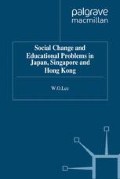Abstract
A quick reply to the first question is that even though education may not produce the desired economic growth, the concept of human investment and the practice of manpower forecasting can at least serve as a guideline to avoid surplus or mismatch of manpower. Moreover, although this approach to education is not satisfactory, other approaches are even less trustworthy and methodologically more demanding. Further, the application ot manpower forecasting in educational planning requires complicated surveys and calculations, making it difficult to challenge (K. Cheng, 1985d, p. 204).
Access this chapter
Tax calculation will be finalised at checkout
Purchases are for personal use only
Preview
Unable to display preview. Download preview PDF.
Author information
Authors and Affiliations
Copyright information
© 1991 W. O. Lee
About this chapter
Cite this chapter
Lee, W.O. (1991). Becoming Credential Societies. In: Social Change and Educational Problems in Japan, Singapore and Hong Kong. Palgrave Macmillan, London. https://doi.org/10.1057/9780230379060_11
Download citation
DOI: https://doi.org/10.1057/9780230379060_11
Publisher Name: Palgrave Macmillan, London
Print ISBN: 978-0-333-51504-4
Online ISBN: 978-0-230-37906-0
eBook Packages: Palgrave Social & Cultural Studies CollectionSocial Sciences (R0)

